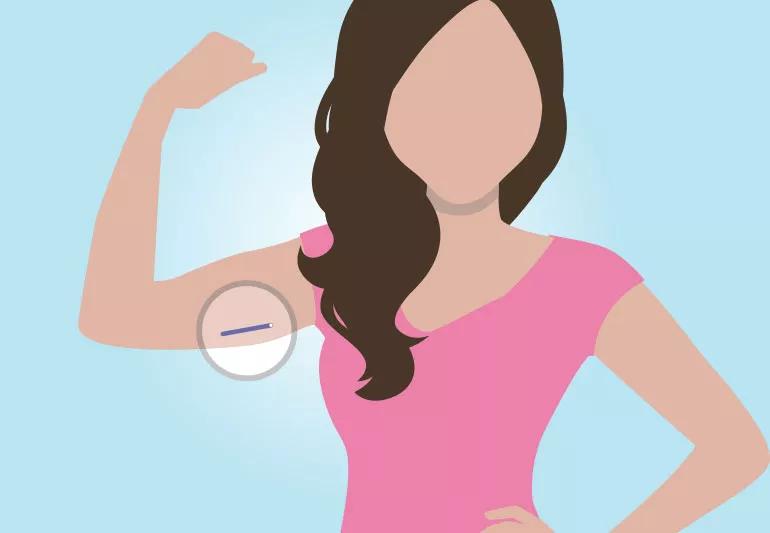Your contraceptive implant questions, answered

Image content: This image is available to view online.
View image online (https://assets.clevelandclinic.org/transform/1448f460-4bf0-4373-b2fe-95b163558fd7/birthControlImplant-1150944979-770x553_jpg)
Illustration of woman with birth control implant under upper arm
If a baby’s not in the cards right now, you need a strategy more effective than crossing your fingers and chanting NOBABYNOBABYNOBABY. Birth control pills are the obvious choice — but they aren’t the only one.
Advertisement
Cleveland Clinic is a non-profit academic medical center. Advertising on our site helps support our mission. We do not endorse non-Cleveland Clinic products or services. Policy
Contraceptive implants are an appealing option for many women who want a set-it-and-forget-it approach to preventing pregnancy. Are they right for you? Ob/Gyn Ashley Brant, DO, answers some of the most-asked questions about implants to help you figure that out.
Officially dubbed Nexplanon©, the implant is a tiny plastic stick inserted in your upper arm. It releases a steady, low dose of hormones to prevent ovulation. Best part? It’s low maintenance. You’ll have to use back-up contraception for a week after it’s inserted, but then this magic piece of plastic will ward off pregnancy for five years.
Sure is. “It’s actually the most effective method of birth control,” Dr. Brant says. Fewer than 1% of women accidentally get pregnant with the implant. And if you decide you’re down for mom-ing, you can remove it at any time and start trying to get pregnant immediately.
The implant’s biggest drawback is unpredictable bleeding, says Dr. Brant. Some women have spotting or irregular periods. That tends to be most common in the first six months, though for some women, it can continue indefinitely. “But there are some tips and tricks we can use to control unpredictable bleeding, so if it happens, check in with your provider,” she says.
Advertisement
On the bright side, there aren’t many other side effects. The implant uses a lower dose of hormones than the pill, she adds, so it’s less likely to cause problems like weight gain or mood swings.
Getting the implant is no big deal. “We give you some numbing medicine and the implant is inserted using a device with a hallow needle containing the implant. It’s so small you don’t need stitches — just a Band-Aid®,” says Dr. Brant. “Nine out of 10 of my patients say it was a lot easier than they expected.”
You probably will go home with a big old bruise on your arm, but that’s about it. Usually, the implant isn’t visible under the skin, and it won’t win you any scar competitions. “If there’s a scar, it’ll be tiny — only 1 or 2 millimeters long,” she says. “Most people wouldn’t even notice it.”
Sometimes the implant can shift a little or move deeper into the arm, but never fear: It’s not going to travel your body like a rogue explorer. When it comes time for your doctor to take it out, the process is similar: After a quick shot to numb the skin, your doctor removes the implant and slaps on a Band-Aid®.
Rarely, the implant can be difficult to remove, requiring an extra visit to see a specialist or even more rarely a trip to the operating room for removal under anesthesia.
The implant is a great option for women who want long-acting, reversible birth control that they don’t need to think about every day, Dr. Brant says. Unlike the IUD, it doesn’t require a pelvic exam or vaginal procedure, which is a plus for many women.
The implant can also be used immediately after giving birth and while breastfeeding, making it a good choice for people who are nursing.
So while you can certainly keep chanting NOBABYNOBABY, you can also rest assured that with a birth control implant, you’re in good hands. (Or arms.)
Advertisement

Sign up for our Health Essentials emails for expert guidance on nutrition, fitness, sleep, skin care and more.
Learn more about our editorial process.
Advertisement
The Yuzpe regimen is less effective than other forms of emergency contraceptives, and it’s associated with more side effects
Both are about equally effective when used properly — IUDs are long-lasting and don’t require you to think about them
Birth control medications are more than 99% effective, but only when used properly
Today’s birth control pills don’t usually cause depression — but hormones affect everyone differently
No, you can’t prevent pregnancy by douching after sex, having sex standing up or having sex only at the ‘safe’ time
IUDs can make your period lighter, heavier, irregular or stop it completely
Birth control gel is simple to use and an effective method for preventing pregnancy
The scenarios vary based on how many pills you’ve missed and whether you take a combination pill or progestin-only pill
Prioritize your health by managing stress, strengthening your social connections and getting quality sleep
Bolsters, blankets, pillows and blocks can offer extra support, stability and comfort
Allergies, postnasal drip, asthma or reflux could be to blame for a cough that won’t quit